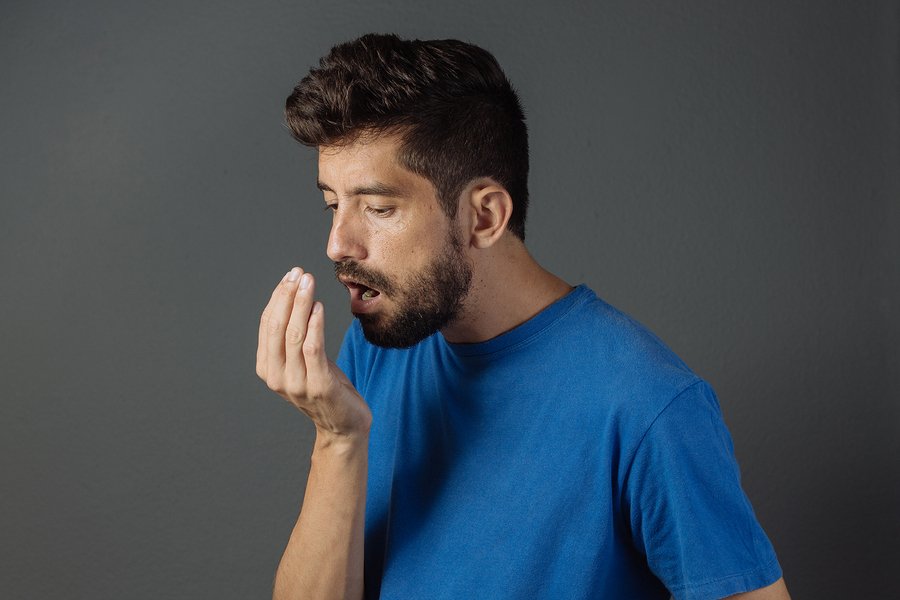While we all experience bad breath from time to time, some people endure chronic problems that interfere with daily life. If you are struggling to control your bad breath, the following guide can help.
What is Halitosis?
In essence, halitosis is the clinical term for bad breath. That said, the term is generally used to describe bad breath that doesn’t seem to go away. While none of us enjoy fresh breath 24 hours a day, some people experience lasting bad breath, despite using gum, breath mints and mouthwash. Unlike ordinary bad breath, which tends to improve after we brush our teeth in the morning, chronic halitosis can persist for hours, days or years. What’s more, many people are unable to sense that they have bad breath unless someone tells them.
How Do You Know if You Have Bad Breath?
Sometimes it’s difficult to tell if you have bad breath until someone points it out. Unfortunately, this can be embarrassing, especially if you realize it has been a problem for quite a while. To check if you have bad breath, look in the mirror and check your tongue. If it is white or yellow, you may have bad breath. You can also try licking the inside of your wrist and then smelling it. If it smells bad, there’s a good chance your breath does too. Just be sure to wash your wrist before you lick it to make sure you don’t accidentally ingest germs.
What Causes Bad Breath?
The vast majority of the time, bad breath stems from poor dental hygiene. In some cases, however, it can be caused by your diet or gastrointestinal issues. Bad breath can also occur due to poorly-fitted dentures, smoking and chewing tobacco. Gum disease, tooth decay and other health issues can also contribute to bad breath. In most cases, people are able to eliminate bad breath by brushing and flossing more regularly. If you can’t improve your bad breath through personal care, see a local dentist to look for underlying causes and alternative treatments.
Why Do Bad Dental Habits Cause Bad Breath?
When we fail to regularly clean our teeth, food particles can promote bacterial growth around the gums, between teeth and on the tongue. As the bacteria consume this food, they release sulfur compounds, which give our breath a foul odor.
What Health Problems Can Lead to Bad Breath?
In certain cases, persistent bad breath can be a sign of periodontal disease. A medical condition called xerostomia, also known as dry mouth, can also promote bad breath. This could be a side effect of certain medications or nasal issues that cause a person to continuously breathe through the mouth.
There are also serious health problems that can promote bad breath, including liver or kidney problems, chronic acid reflux, respiratory tract infections, bronchitis, pneumonia, postnasal drip and diabetes.
How Do I Cure Bad Breath?
There are all sorts of products that claim to eliminate halitosis. In reality, the only effective way to eliminate bad breath is by improving your dental hygiene. This means flossing twice a day and brushing after every meal. You should also use a tongue scraper to eliminate bacteria from your tongue.
How Can I Avoid Bad Breath?
The best way to prevent bad breath is by brushing and flossing on a regular basis. You should also visit your dentist for regular cleanings to eliminate tartar and plaque from hard-to-reach areas. There are also certain foods that can make your breath smell foul. Onions, garlic and coffee can all be detected on your breath for up to 72 hours after consumption. Some foods, such as garlic, even emit odor through the lungs after they are digested.
Is There a Bad Breath Home Remedy?
Contrary to what you may have heard, there is no home remedy that can eliminate bad breath. While mints and mouthwash might conceal bad breath for a while, the problem will return once these wear off. To eliminate bad breath, you have to eliminate the bacteria that are causing it in the first place. This means improving your oral hygiene. It can also mean drinking more water to flush away bacteria and keep your mouth from getting dry.
When to See a Dentist
If you suffer from chronic bad breath, consider your oral hygiene habits and make some targeted lifestyle changes. Brush your tongue and teeth after eating, drink plenty of water and use dental floss. If these steps aren’t enough, make an appointment to see a dentist. If he or she determines that your bad breath is caused by bacterial buildup, the dentist may recommend an oral rinse and/or toothpaste that contain an antibacterial agent.
If your dentist determines that gum disease is the cause of your bad breath, he or she may refer you to a periodontist, who can perform a professional cleaning to remove bacteria from pockets in your gums. Your dentist may also recommend replacing failing tooth restorations, which can act as breeding grounds for bacteria. If, on the other hand, your dentist suspects that a health condition might be causing your halitosis, he or she may refer you to a doctor, who can run tests to determine the underlying cause of your problem.
When you visit your dentist for an evaluation, avoid wearing perfume, scented lotion or lipstick to your appointment, since these could all mask any odors. You should also notify your dentist if you have taken any antibiotic medications within the past several weeks. Finally, consider scheduling your appointment in the morning, before you’ve had a chance to eat any foods which might make it hard for your dentist to isolate the cause of your bad breath.


 Previous Article
Previous Article

